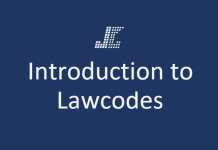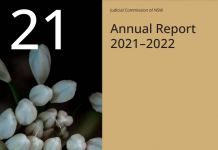What our governance practices achieve
Our governance practices ensure that:
- we fulfil our statutory functions effectively and efficiently
- we are accountable for our actions
- risk management and auditing processes are properly understood and managed, and
- our leadership helps us to realise our vision, carry out our mission, hold to our values and achieve our goals.
Responsibilities of official and appointed Commission members
The Judicial Commission members set strategic directions, appoint the executive management team, approve budgets and publications, present judicial education sessions, and conduct the preliminary examination of all complaints. The official members who are judicial officers provide valuable information about judicial officers’ education needs and bring their significant experience of the judicial role to determining complaints. The appointed members provide useful information about community expectations of judicial officers and have input into the education program.
Commission members are informed about operational issues through:
- the Chief Executive’s monthly report covering functional and financial matters
- briefings on issues as they arise
- contact with senior executives as required.
For information about Our members, click here.
Commission functions
The Judicial Commission may delegate any of its functions to a Commission member, officer or committee. The Commission has delegated functions to the Chief Executive, including its function as an employer and its access to information obligations. The Commission has established committees to assist carrying out designated responsibilities. The Commission seeks independent professional advice when necessary to perform certain functions.
Remuneration arrangements for members
Appointed members receive a fee for fulfilling their responsibilities including attending meetings, examining complaints, setting strategic directions, and approving budgets and publications. Their annual rate of remuneration is determined by the NSW Statutory and Other Offices Remuneration Tribunal in accordance with section 50 of the Judicial Officers Act 1986. No fees are paid to official members who are judicial officers.
Commission meetings
Commission meetings are held 10-11 times a year. Members are required to attend each meeting, unless leave of absence is granted. The quorum for a meeting is 7 members, and at least one must be an appointed member. The Chief Executive attends all meetings to report on the Commission’s operations. Meeting papers are circulated 1 week before the meeting to allow sufficient time for members to review agenda items and seek further information.
Role of the Chief Executive
The Chief Executive is responsible for all of the Judicial Commission’s operations and for the preparation of the financial report in accordance with Australian Accounting Standards, the Public Finance and Audit Act 1983 and the Public Finance and Audit Regulation 2015. This includes establishing and maintaining internal controls relevant to the preparation of the financial report. The Chief Executive is also responsible for the adequacy of digital information, and information systems security obligations.
Appointment of the Chief Executive
The Chief Executive is appointed on a contract under section 6(1) of the Judicial Officers Act 1986. Commission members review the Chief Executive’s performance each year.
Conflicts of interest
Official members are judicial officers and this could result in a conflict of interest if a member were the subject of a complaint. It is Judicial Commission policy that a judicial member will not participate in any discussion or decision involving a complaint against him or her. No member will participate in any discussion or decision where that member has a possible conflict of interest.
Code of Conduct
The Judicial Commission’s Code of Conduct applies to staff members, and to anyone engaged to provide services, information or advice to the Commission. The Code is published on the Commission’s intranet and new employees receive a copy of this in their induction package. The Code is based on the premise that staff members will act with integrity, honesty, fairness, conscientiousness, compassion and loyalty to the public interest. Staff members are expected to uphold the Code which outlines principles in relation to confidential information, suspected corrupt conduct, acceptance of gifts or benefits, personal and professional behaviour, public comment and the use of official information, proper use of Commission facilities and equipment, outside employment, political participation, discrimination and harassment, fairness and equity and conduct expected of former employees.
Relationship with the NSW Government
The Judicial Officers Act 1986 established the Judicial Commission as an independent statutory corporation. The NSW Government provides the majority of our funding and we are required to report each year to Parliament. The Commission may give advice to the Attorney General on appropriate matters and the Attorney General may refer a complaint about a judicial officer to the Commission. The Attorney General may request information about a complaint and the Commission must provide this information unless it is not in the public interest to do so. The Commission must also notify the Attorney General when a complaint has been referred to the Conduct Division and how and when the complaint is finalised.










